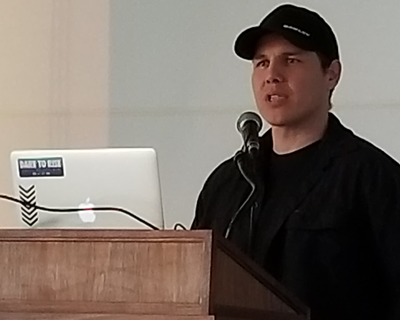Loss of indigenous languages like libraries burning down
The Year of Indigenous Language proclaimed by the United Nations was celebrated during First Peoples Week at Dawson College April 1-5.
“Language is the vessel that holds traditional knowledge,” said Kanentokon Hemlock during his talk entitled Language Revitalization and Decolonization on April 2. “When we lose a language, it is like watching a library burn down. It is not only the language, it is the culture, the vision, the knowledge and wealth of a people that is lost.”
Indigenous people urged the U.N. to declare the special year, Kanentokon told about 100 students and teachers at Dawson. “We want to bring the world’s attention to the state of our indigenous languages,” he said.
Kanentokon, who is currently working toward a Master’s degree in Indigenous Language Revitalization at the University of Victoria, was part of a delegation of Mohawks from Kahnawake in 2016 that met with global experts in the field of Indigenous languages and urged the U.N. to declare the special year.
“It is of dire importance to protect the world’s Indigenous languages. It is estimated that there are 6,000 – 7,000 languages in the world, 4,000 are Indigenous and 3,000 are in serious danger,” he said. “This is a serious concern to human rights, the rights of minorities and the rights of Indigenous peoples.”
Kanentokon spoke about the alarming numbers related to the six languages of the Haudenosaunee (Iroquois Confederacy), which includes the Kanien’kehá:ka. Today there are 4,000 first-language speakers of Kanien’keha in seven communities. The other five languages have from less than 200 first-language speakers to 0. And about 85% of these speakers are over 65 years old.
Kanentokon likes to look at the situation in a hopeful way and prefers calling languages “dormant” rather than extinct. He sees many First Nations people making efforts to revitalize their languages. “It is a race against time though. Second-language learners have to raise their kids as first-language speakers. We have to find ways to breathe life back into our languages.”
He covered a lot of ground in a one-hour talk, including a survey of how this precarious situation of Indigenous languages came to be and how his community of Kahnawake persevered, including the story of the creation of the Kahnawake Survival School. “Losing our language wasn’t something that just happened. It was a 100-year plan. …After everything they did, we are still here and still part of this world. We are not against you. We are equal to you.”
“We need to share our story with you. …The state of our language is a canary in the coal mine for you.”
Another speaker at Dawson College’s First Peoples Week, André-Yanne Parent, Executive Director of The Climate Reality Project Canada, spoke about climate change on April 4.
André-Yanne, a Mi’gmaq, gave an overview of the situation saying that “our house is on fire” and offered some solutions, including many ideas for mobilization. André-Yanne also mentioned the link between the loss of Indigenous languages and the state of the world’s climate crisis.
“It is important to hear and listen to indigenous communities,” she said. Some of the proposed solutions are to amplify Indigenous voices and to reconnect with traditional practices. “We belong to the land; we don’t own it,” she said referring to the Indigenous worldview. Other solutions are to speak up, to not let denial of climate change go unchallenged and to use social and traditional media to get the word out.
The United Nations states the importance of Indigenous languages: “The ongoing loss of Indigenous languages is particularly devastating, as the complex knowledge and cultures they foster are increasingly being recognized as strategic resources for good governance, peacebuilding, reconciliation, and sustainable development.”
First Peoples Week at Dawson College offered panels, workshops and events that explored the United Nations Year of Indigenous Languages, climate change, land-based learning and more.
Dawson College welcomes First Nations, Inuit and Métis students in a program tailored to their needs called Journeys to ease the transition to cégep. At Dawson, the First Peoples Centre provides comprehensive services, including academic, para-academic and cultural support, for Indigenous (First Nations, Metis, and Inuit) students. In addition, the First Peoples’ Centre provides access to Indigenous resources, college-wide. The Centre offers a peaceful, culturally sensitive environment where students can learn, study, socialize, and find community.
The First Peoples Centre is one of the beneficiaries of Artists in Bloom, held at Dawson College on April 18. Student-artists will create works of art live, which will be auctioned to benefit Dawson College First People’s Initiative and Youtheatre.
Tickets are available to the general public here:
https://www.dawsoncollege.qc.ca/dawson-foundation/funds-activities/artists-in-bloom/



